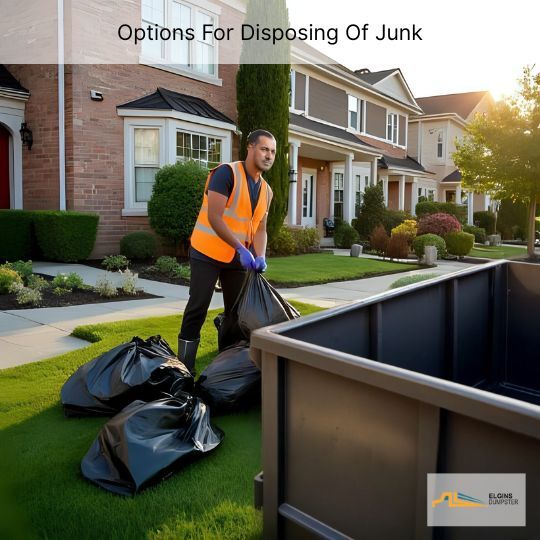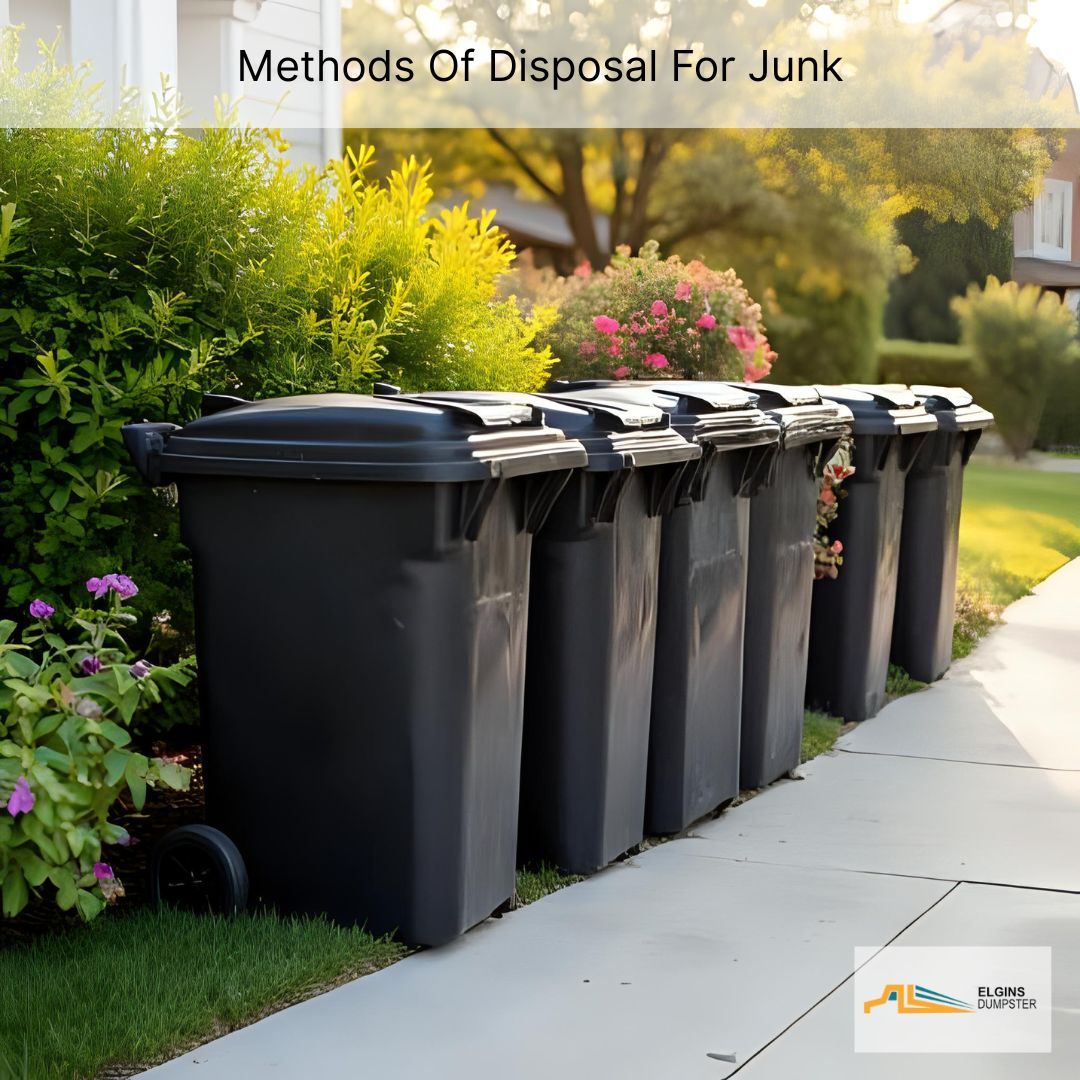Junk disposal in the United States is regulated at the municipal, county, and state levels, depending on location. Homeowners, renters, and business owners dispose of waste using six core methods: municipal collection, private junk removal services, recycling centers, donation and reuse networks, roll-off dumpster rentals, and landfill drop-offs.
Each method aligns with specific waste types and volumes. Local governments typically offer curbside collection and scheduled bulk pickups. Private haulers and dumpster rental companies assist with larger volumes or mixed materials. Recycling centers accept sorted recyclables like plastics and metals. Donation centers divert usable goods from landfills. Landfills handle final disposal for materials that cannot be reused, recycled, or handled by curbside programs.
Hazardous waste, including chemicals, electronics, batteries, and refrigerant appliances, must be taken to designated Household Hazardous Waste (HHW) drop-off sites. Regulations vary by state and city, so it is essential to verify what your local jurisdiction permits.
Common Methods for Junk Disposal

1. Municipal Waste Collection
Most U.S. cities and counties provide curbside garbage collection, recycling, and seasonal or scheduled bulk pickups. This method is best for household trash, yard waste, and small furniture items.
Common restrictions include:
Paints, oils, and flammable liquids
Electronics and batteries
Large appliances with Freon
Construction debris
Residents should contact their local Solid Waste or Public Works department for pickup schedules, accepted items, and service requests.
2. Private Junk Removal Services
Licensed junk removal services operate in every major U.S. metro and many rural areas. These providers handle on-demand cleanouts, including hoarding situations, renovation debris, real estate turnovers, or commercial office waste.
Services often include labor, truck loading, and item sorting for donation or recycling. Pricing is typically based on load size and material type.
3. Recycling Centers and Drop-Off Locations
Every state supports recycling through drop-off stations or curbside programs. Accepted recyclables may include:
Paper, cardboard
Aluminum, steel
Plastics #1–#7
Glass (varies by jurisdiction)
Not accepted in standard recycling streams:
Plastic bags
Electronics (in most areas)
Contaminated food containers
Lithium batteries
Recycling facilities are usually managed by counties, regional authorities, or private contractors.
4. Donation and Reuse Programs
Many household items in good condition can be donated rather than discarded. National nonprofit networks accepting donations include:
Goodwill
Habitat for Humanity ReStores
Salvation Army Thrift Stores
Vietnam Veterans of America
Local shelters and faith-based organizations
Accepted items typically include furniture, appliances, clothing, electronics, and housewares. Many groups offer free pickup for large donations.
5. DIY Disposal and Landfill Visits
Residents with pickup trucks or trailers can self-haul waste to municipal or regional landfills. This method is ideal for construction debris, oversize loads, and mixed materials.
Most landfills charge a tipping fee based on volume or weight. Hazardous items are not accepted without prior screening.
You must check landfill rules on:
Accepted materials
Hours of operation
Residency requirements
Permit or voucher policies
6. Roll-Off Dumpster Rental
Roll-off dumpster rentals provide flexible disposal for home renovations, roof tear-offs, large landscaping projects, or commercial cleanouts. Dumpsters are delivered on-site and picked up once filled.
Standard sizes include: 10, 20, 30, and 40-yard containers
Prohibited items typically include:
Paints and oils
Tires and batteries
Electronics
Refrigerators and air conditioners
Medical or hazardous waste
Dumpster rentals are ideal for projects that generate ongoing or high-volume waste and require on-site containment.
How to Dispose of Hazardous Junk
Hazardous materials require special disposal at certified HHW facilities. These are operated by county governments, public utilities, or environmental agencies, often on scheduled drop-off days or at permanent centers.
Common hazardous waste includes:
Oil-based paints and solvents
Automotive fluids (oil, brake fluid, antifreeze)
Cleaning chemicals and bleach
Rechargeable batteries and car batteries
CFLs, fluorescent tubes, and mercury thermometers
Electronics: TVs, laptops, printers
Pesticides, pool chemicals, and aerosol sprays
Refrigerant-based appliances (fridges, A/C units)
To locate a hazardous waste facility in your state, visit:
https://www.epa.gov/hw/household-hazardous-waste-hhw
What Items Are Considered Hazardous?
Hazardous items vary slightly by state, but generally include:
Paint and varnish
Gasoline, diesel, oil
Bug sprays and weed killers
Chemical cleaners
Batteries (all types)
Electronics
Freon appliances
Never place hazardous materials in trash cans, dumpsters, or sewers.
U.S. Regulations for Special Waste
Special waste includes anything that is flammable, corrosive, toxic, or environmentally harmful. Each state enforces its rules through environmental agencies or health departments.
Key federal standards:
EPA Resource Conservation and Recovery Act (RCRA)
DOT transportation regulations for hazardous waste
State-level environmental compliance (DEQ, DEP, etc.)
Disposal must follow strict handling, packaging, and transportation protocols. Fines for illegal dumping can reach $25,000–$50,000 per day per violation.
Always check with your local solid waste authority before disposing of special or questionable items.


